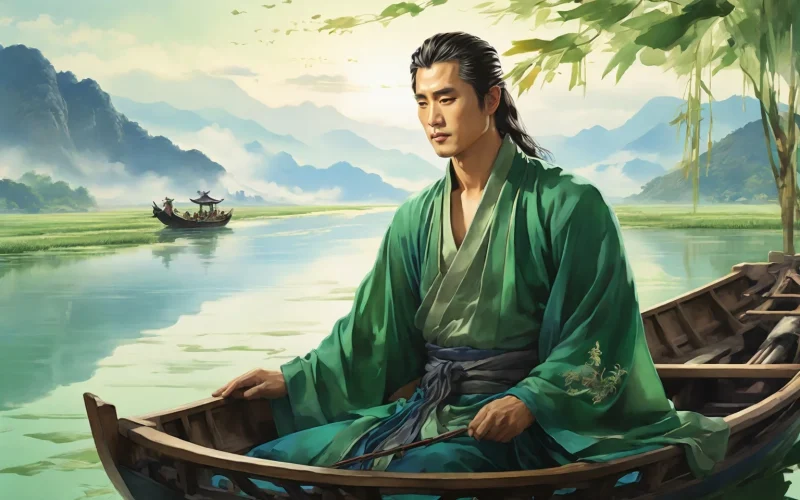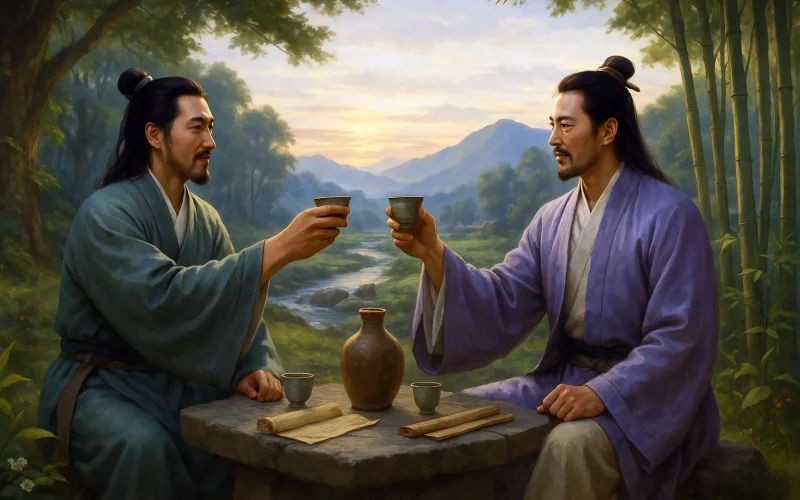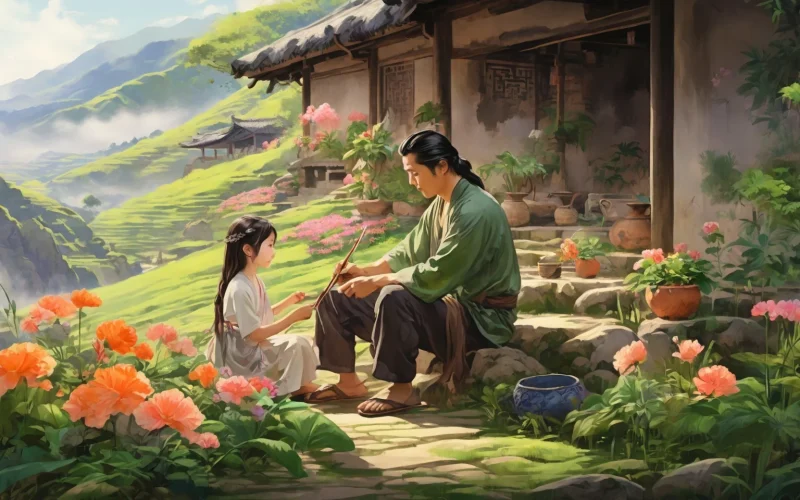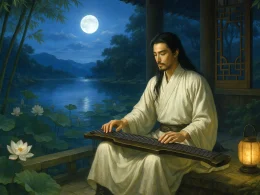Time flies like an empty boat with swift oar;
Four seasons circulate and reappear.
Looking back, the New Year’s Day is no more;
Now we come near the middle of the year.
By southern window there’re no withered trees;
In northern grove we find leaves lush and green.
Morning seems beautified by summer breeze,
And timely rain washes the country clean.
Who comes on earth shall go, such is our fate,
And what begins will end, such is our life.
Though changeless, for the changeful we may wait;
Content with poverty won’t lead to strife.
Our life is full of weal and woe,
On ups and downs our mind can’t rest.
If we don’t care for what is high or low,
Why should we climb to mountain crest?
Original Poem
「五月旦作和戴主簿」
陶渊明
虚舟纵逸棹,回复遂无穷。
发岁始俯仰,星纪奄将中。
南窗罕悴物,北林荣且丰。
神萍写时雨,晨色奏景风。
既来孰不去?人理固有终。
居常待其尽,曲肱岂伤冲。
迁化或夷险,肆志无窊隆。
即事如已高,何必升华嵩。
Interpretation
Written in 413 AD when Tao Yuanming was forty-nine, this poem employs nature's cyclical transformations to expound on life's brevity and the philosophy of conforming to natural order. This enlightened perspective perfectly reflects his state of mind after embracing reclusion.
First Couplet: "虚舟纵逸棹,回复遂无穷。"
"Xū zhōu zòng yì zhào, huífù suì wúqióng."
An empty boat drifts with carefree oars / In endless cycles it forever soars
The poet uses the "empty boat" as a metaphor for the passage of time, suggesting human life resembles a skiff moving with the current in perpetual motion. This opening establishes both dynamic imagery and the transience of existence.
Second Couplet: "发岁始俯仰,星纪奄将中。"
"Fā suì shǐ fǔyǎng, xīngjì yǎn jiāng zhōng."
The new year's span begins its flight / The stars already mark mid-year's height
Temporal acceleration is conveyed through celestial imagery. "Bow and lift" (俯仰) vividly captures time's unnoticed passage, while "star cycles" (星纪) symbolize the year's halfway point, implying quiet lament.
Third Couplet: "南窗罕悴物,北林荣且丰。"
"Nán chuāng hǎn cuì wù, běi lín róng qiě fēng."
South window's plants seldom fade / North woods flourish in vibrant shade
Seasonal contrasts mirror life's vicissitudes. The observation that nature withers yet regenerates reflects on human mortality and renewal.
Fourth Couplet: "神萍写时雨,晨色奏景风。"
"Shén píng xiě shí yǔ, chén sè zòu jǐng fēng."
Magic duckweed drinks timely rain / Dawn hues play with zephyrs' refrain
"Divine duckweed" (神萍) symbolizes human encounters with fortune, embodying acceptance of nature's rhythms. "Timely rain" and "scenic breeze" create harmonious seasonal tableaus.
Fifth Couplet: "既来孰不去?人理固有终。"
"Jì lái shú bù qù? Rén lǐ gù yǒu zhōng."
Since all that comes must go / Why mourn life's certain woe?
The rhetorical question underscores mortality's inevitability. Tao embraces life's natural cycle without resistance.
Sixth Couplet: "居常待其尽,曲肱岂伤冲。"
"Jū cháng dài qí jìn, qū gōng qǐ shāng chōng."
At home I wait life's certain end / Bent-arm pillow won't peace offend
Referencing Confucius' famous frugality ("using a bent arm as pillow"), Tao asserts simple living preserves inner tranquility.
Seventh Couplet: "迁化或夷险,肆志无窊隆。"
"Qiān huà huò yí xiǎn, sì zhì wú wā lóng."
Fate may bring ease or plight / My will stays free and light
Regardless of circumstance, the poet maintains spiritual freedom and equanimity.
Eighth Couplet: "即事如已高,何必升华嵩。"
"Jí shì rú yǐ gāo, hébì shēng huá sōng."
When mind transcends worldly sight / Why climb Hua or Song's height?
Using sacred mountains (Hua and Song) as metaphors for worldly achievements, Tao suggests true elevation comes from mental transcendence rather than physical or social climbing.
Holistic Appreciation
The poem progresses from natural observations to philosophical revelations, methodically developing Tao's worldview of accepting life's transience. Blending seasonal metaphors with existential reflections, it constructs a spiritual realm of enlightened resignation. The work exemplifies how Tao's reclusive life nurtured profound insights into nature-human correspondences.
Artistic Merits
- Vivid Symbolism: The "empty boat" and "divine duckweed" create rich metaphorical layers.
- Philosophical Depth: Seamless transitions from nature's cycles to human mortality demonstrate masterful conceptual unity.
- Lucid Profundity: Simple diction conveys complex existential wisdom without pretension.
Insights
Tao's poem articulates an ancient yet timeless wisdom: by aligning with nature's rhythms, we achieve liberation from existential anxiety. His perspective offers modern readers an antidote to achievement-oriented stress - true peace comes not from conquering mountains (literal or metaphorical), but from harmonizing with life's inherent flow. In an age obsessed with productivity and permanence, this 1,600-year-old verse reminds us that embracing impermanence itself becomes the path to freedom.
Poem translator
Xu Yuan-chong (许渊冲)
About the poet

Tao Yuanming(陶渊明), 365–427 CE, was a poet, literary figure, fu writer, and essayist active during the late Eastern Jin and early Liu Song dynasties. Born in Chaisang (near present-day Jiujiang, Jiangxi Province), he pioneered a new genre of pastoral-themed literature, expressing profound philosophical insights through simple language. His poetic style became an enduring aesthetic standard in classical Chinese poetry.











